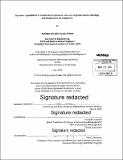Dynamic capabilities in related diversification : the case of geothermal technology development by oil companies
Author(s)
Garćia Palma, Rodrigo Salvador
DownloadFull printable version (33.57Mb)
Other Contributors
Massachusetts Institute of Technology. Technology and Policy Program.
Advisor
Donald R. Lessard.
Terms of use
Metadata
Show full item recordAbstract
During the peak oil price period of the 1970s and the first half of the 1980s, 12 major oil firms decided to diversify into the geothermal energy business under the assumption that they could easily leverage their upstream oil capabilities for that purpose. In this thesis I examine how oil firms achieve a successful related-diversification into geothermal energy technologies building on the case studies of Union Oil Company of California and Phillips Petroleum and encompassing 5 geothermal fields and 28 units of analysis that represent the knowledge sources and transfer mechanisms required to overcome the technological and managerial differences between upstream oil and geothermal. The evidence is constructed based on backward patent citation analysis, company reports, literature review and in-depth interviews with the engineers and managers that ran the geothermal business. The two case studies are used to demonstrate that core competencies inherited from upstream oil are necessary but not sufficient to diversify into a related business field. Correspondingly, this research introduces the concept of "dynamic capabilities" to explain how the main enablers of the successful diversification into geothermal energy in the two cases studied, were each firm's dynamic capabilities of: absorbing knowledge from the industrial ecosystem, developing and exploiting internal scientific knowledge, and empowering decentralized business units. Understanding the way that oil firms leveraged their own competencies to diversify into geothermal energy during the oil price crisis can provide important insights into how oil and gas and other extractive industries can meet the sustainability challenges they currently face, and to enhance technology transfer in general. An additional contribution of this thesis is to frame its propositions by integrating concepts from the technology strategy literature into a causal-loop representation of the different factors that influence the evolution of a firm's knowledge stock and its transition into related business fields.
Description
Thesis: S.M. in Technology and Policy, Massachusetts Institute of Technology, Engineering Systems Division, Technology and Policy Program, 2014. Cataloged from PDF version of thesis. Includes bibliographical references (pages 161-173).
Date issued
2014Department
Massachusetts Institute of Technology. Engineering Systems Division; Technology and Policy ProgramPublisher
Massachusetts Institute of Technology
Keywords
Engineering Systems Division., Technology and Policy Program.